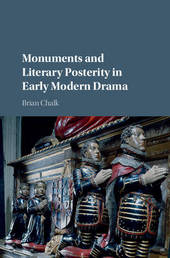
|
Monuments and Literary Posterity in Early Modern Drama
Hardback
Main Details
| Title |
Monuments and Literary Posterity in Early Modern Drama
|
| Authors and Contributors |
By (author) Brian Chalk
|
| Physical Properties |
| Format:Hardback | | Pages:231 | | Dimensions(mm): Height 234,Width 157 |
|
| Category/Genre | Literary studies - c 1500 to c 1800
Literary studies - plays and playwrights |
|---|
| ISBN/Barcode |
9781107123472
|
| Classifications | Dewey:822.309 809.203 |
|---|
| Audience | | Professional & Vocational | |
|---|
| Illustrations |
6 Halftones, unspecified; 6 Halftones, black and white
|
|
Publishing Details |
| Publisher |
Cambridge University Press
|
| Imprint |
Cambridge University Press
|
| Publication Date |
19 November 2015 |
| Publication Country |
United Kingdom
|
Description
In spite of the ephemeral nature of performed drama, playwrights such as Marlowe, Jonson, Webster, Fletcher, and Shakespeare were deeply interested in the endurance of their theatrical work and in their own literary immortality. This book re-evaluates the relationship between these early modern dramatists and literary posterity by considering their work within the context of post-Reformation memorialization. Providing fresh analyses of plays by major dramatists, Brian Chalk considers how they depicted monuments and other funeral properties on stage in order to exploit and criticize the rich ambiguities of commemorative rituals. The book also discusses the print history of the plays featured. The subject will attract scholars and upper-level students of Renaissance drama, memory studies, early modern theatre, and print history.
Author Biography
Brian Chalk is Assistant Professor of English at Manhattan College, New York. He has published essays on early modern drama and culture in journals including Studies in Philology and Studies in English Literature, 1500-1900.
Reviews'This is at once an admirable study of the paradoxes of memorialization in several important Renaissance dramatic texts, and a significant intervention in the contemporary critical conversation.' Clara Calvo, Universidad de Murcia, Spain
|